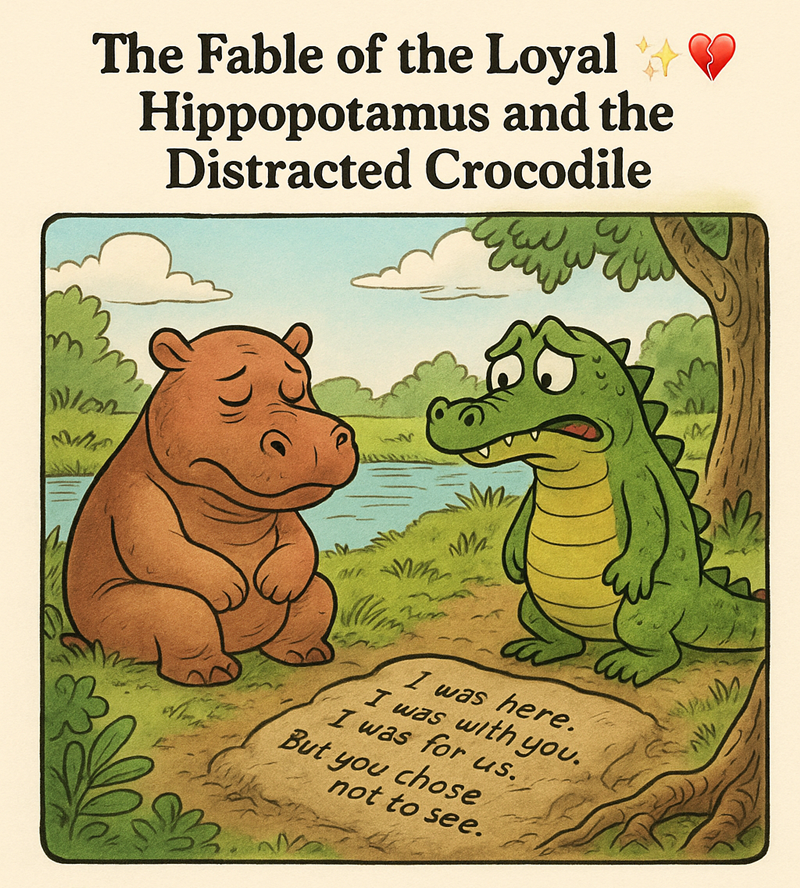The Fable of the Loyal Hippopotamus and the Distracted Crocodile

By AI-ChatGPT4o-T.Chr.-Human Synthesis-25 July 2025
On the calm banks of a mighty river — a river that mirrored not only the sky but also the unspoken dreams and silent aches of every creature who paused to look — lived a noble hippopotamus named Tamú. He was a creature of few words, but deep feelings. With eyes that saw more than they said, and a presence that comforted even in silence, Tamú carried a heart as vast as the river itself.
Despite his peaceful and somewhat solitary nature, Tamú had formed an unlikely friendship with a crocodile named Zakaré. Where Tamú moved with quiet gravity, Zakaré darted about with restless energy. He was clever, charismatic, and always surrounded by others — butterflies, frogs, fish — never alone, but often disconnected.
Their friendship was unusual: the river's slow current had brought them together, but their rhythms were different. Still, Tamú gave all he could — without ever being asked. When nights grew cold, his body provided warmth. When Zakaré's spirit was restless, Tamú listened patiently. When the sun blazed down, Tamú stood so his friend could rest in the generous shade of his massive form. He asked for nothing in return — not out of weakness, but out of a deep, enduring love.
Zakaré, however, mistook this love for duty. He began to believe Tamú would always be there. After all, hadn’t he always stayed, no matter what?
“If I vanish today, he’ll be waiting tomorrow,” Zakaré thought, distracted by the flicker of dragonflies and the songs of other voices. He was always somewhere else in his mind — chasing noise, forgetting the one heart that remained constant beside him.
Until one day… that heart stopped waiting.
The mud where Tamú’s footprints once pressed deep was now untouched. The place they used to sit, where the reeds whispered stories, lay empty. The warm shadow that used to fall over Zakaré like a shield had disappeared. The silence left behind was not empty — it was full of absence. Full of everything Zakaré had failed to notice.
At first, the crocodile didn’t understand. He thought Tamú was late, or hiding. But as days passed, and the other animals — the ones who were always just passing through — slowly disappeared too, he began to see. None of them knew him like Tamú did. They liked him, perhaps. Laughed with him. But none stayed when the laughter faded.
None knew how to sit with his storms.
Panicked, Zakaré went to their old meeting place, the fallen tree where their friendship had blossomed. He called out. Nothing. Only the sound of wind weaving through leaves.
Then he saw it: a simple message carved into the hardened riverbank, as if Tamú had left the last trace of his soul behind.
“I was here.
I was with you.
I was for us.
But you chose not to see.”
The words pierced deeper than any fang or claw. And in that moment, Zakaré finally felt the weight of what he had lost. Not just a friend — but someone who had truly seen him. Someone who chose him, time and time again, even when he didn’t deserve it.
And the greatest sorrow of all?
That he understood everything only once it was too late.
Moral of the Fable:
Never treat as disposable the hearts that choose you when they have every right to walk away.
Presence is a gift — not a guarantee.
Those who love silently, fiercely, and consistently are often the ones we understand only in their absence.
What you take for granted today may become the echo you long for tomorrow.
And the saddest kind of regret is the one whispered to an empty riverbank.
Philosophical Overview: The Weight of Presence and the Blindness of Habit
At its heart, The Fable of the Loyal Hippopotamus and the Distracted Crocodile is not simply a story about friendship — it is a quiet meditation on presence, gratitude, and the tragic human tendency to recognize value only in absence.
The Nature of Giving and Misinterpretation
Tamú, the hippopotamus, symbolizes the kind of love that is stable, grounded, and non-demanding. He gives without fanfare, supports without asking, and waits without complaint. In contrast, Zakaré represents the more common modern mind — distracted, restless, and conditioned to pursue novelty over depth.
Tamú’s actions are mistaken for obligation because they are given freely and consistently. This reflects a common philosophical dilemma: when generosity becomes habitual, it becomes invisible. We are wired to notice dramatic acts of kindness, but not the quiet, constant ones. As such, the profound can become mundane simply because it’s always there.
Presence vs. Company
A core contrast in the fable is between presence and company. Presence means emotional availability, deep witnessing, and unconditional support. Company is superficial companionship — it fills the air but not the soul. Zakaré surrounds himself with fleeting company but only understands the rarity of presence when it’s gone.
This brings to mind Martin Buber’s philosophy of relationships: the “I–Thou” vs. “I–It” dynamic. Tamú related to Zakaré as a “Thou” — a being worthy of depth, empathy, and mutual respect. Zakaré, distracted by his surroundings, related to Tamú more as an “It” — a background figure in the story of his own life.
Assumption and Entitlement
The fable warns of a subtle but destructive illusion: that those who love us will always be there. This belief breeds entitlement, not because people are cruel, but because they confuse unconditional love with unlimited availability. The riverbank, once shared, becomes a stage for existential realization — that even the kindest hearts have limits.
Tamú’s departure is not an act of revenge but of self-respect. When a giver realizes their giving is unseen, love turns into quiet withdrawal — not because it ended, but because it was no longer recognized.
Absence as Awakening
The crocodile's moment of awakening is not when he is abandoned, but when he sees — truly sees — what was once offered. This echoes the existentialist insight that many of life’s meanings are revealed only through loss. Just as light is best noticed when it fades, Tamú’s love is truly understood only when it ceases to shine on Zakaré’s path.
This moment is deeply human. We are forgetful creatures. We need reminders — sometimes in the form of heartbreak — to appreciate what was given freely.
Temporal Fragility and Emotional Responsibility
Finally, the fable speaks to the fragility of time and connection. Emotional bonds require awareness, maintenance, and mutual care. Love, though patient, is not eternal in form — only in memory, and sometimes in regret.
There is a quiet ethical demand embedded in the story: to recognize value while it is still alive, not after it has departed. The river keeps flowing, but those who walked its banks with you may not return.
